10 Things We Learned From WWE SummerSlam 1999
Stone Cold Steve Austin gave Triple H a "HELL NO!"

Aug 1, 2018
You know professional wrestling is in a very weird sort of zone when a major promotion is able to land a sitting Governor for a high-profile gig. Never mind the fact that said Governor was an ex-wrestling great who leveraged his rare charisma and ability to read a crowd into a political upset - it was just a sign of the times in 1999 that pro wrestling was on this unfathomable level.
Jesse "The Body" Ventura returned to the wrestling fold after five years away, rejoining the very WWE he'd once acrimoniously left behind for, turning even more eyes and ears toward the wildly-popular sports entertainment fad. His participation as the guest referee for SummerSlam 1999's main event ruffled a few feathers (which we'll get to a bit later on), but it was all about fun for WWE, who was by now lapping WCW several times over, double-fisting victory brews all the while.
SummerSlam 1999 was easily one of WWE's better pay-per-views of 1999, a year in which too much Crash TV saturated the basic tenets of what pro wrestling is all about (long term builds, a reasonable in-ring product), but it didn't matter. The Attitude Era's party showed no signs of stopping, as WWE continued its soiree for many days to come.
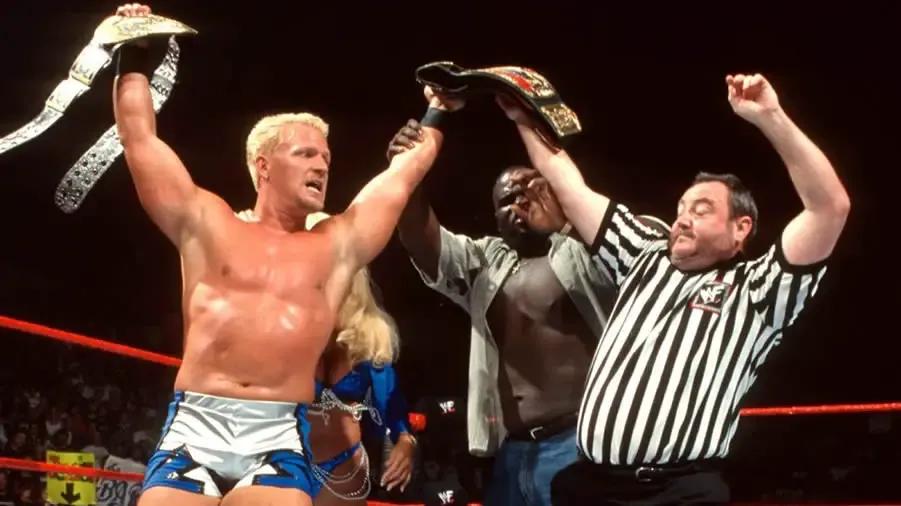
The opening match of the 1999 SummerSlam saw Jeff Jarrett defeat D-Lo Brown, with an assist from Mark Henry, to capture both the Intercontinental and European belts. The next night, Jarrett simply handed the European strap over to Henry as a thank-you present (the first and only belt Henry would hold until 2008, incredibly), because Jarrett had no need for that particular title. The IC belt was where it was at.
With the win, Jarrett became the first wrestler to hold the Intercontinental gold on six occasions. Three months earlier, his win over The Godfather tied him with Razor Ramon with the most all-time at four. A lose/win weekend with Edge in July 1999 gave him a record-setting five, and the win over Brown only extended his mark to a once-unthinkable level. That is, until four years later when Chris Jericho made it to six himself, before earning a record-breaking seventh in September 2004. Jericho has since made it to nine, while The Miz sits at eight reigns. Jarrett is tied for third overall with Rob Van Dam and Dolph Ziggler, still at six.

A sitting politician getting involved in pro wrestling (whether he was an ex-wrestling personality or not) is going to stir at least a modicum of bad press. A sitting politician getting involved in pro wrestling during the unapologetically-tawdry Attitude Era is going to draw even further ire. Ventura's return to the squared circle for a one-night hosting gig in 2009 had nothing on the firestorm caused by his association with the morally-questionable WWE product of 1999.
WWE, however, did make a few alterations to the SummerSlam card in order to give Ventura less to answer for at future pressers. One notable change to the show, according to The Wrestling Observer, was that The Godfather and Val Venis were removed from the Tag Team Turmoil match, since it may not have been wise for Ventura to share a broadcast with a porn star, a pimp, and said pimp's bevvy of dolled-up prostitutes. That was slightly ironic, considering that Ventura himself had openly advocated legalizing prostitution.

If you've read any Chris Jericho's poignant and hilarious books, you'll know that Y2J has had a history of delivering subpar performances in his first match/appearance with a new promotion. He refers to this bizarre phenomenon "The Jericho Curse", and although he can find retroactive humour in such situations, they were major thorns in his side in their respective moments.
Case in point, Jericho's Raw debut. While we tend to remember it as a hallmark happening, Jericho was aghast at how much weakness he showed after Rock's powerful retort. The next edition of Raw saw Jericho earn scorching heat for referring to The Undertaker as "boring", and suddenly, the hotly-anticipated Jericho debut was foaming and fizzling. His gabfest with Road Dogg at SummerSlam would come off far better, and Jericho would call it one of the few segments of his early on that went well.
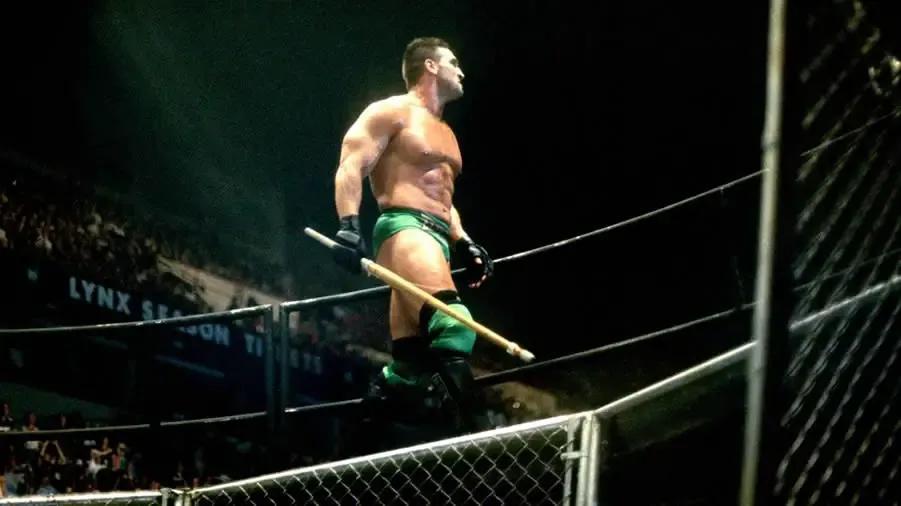
In the fifth match of the night, Ken Shamrock called back to his 1998 SummerSlam experience, performing once more in a special Lion's Den match. This time around, it would be a weapons-filled cage against fellow fighting machine Steve Blackman. Shamrock would emerge victorious, and the match would be notable as the last WWE pay-per-view bout for "The World's Most Dangerous Man".
Shamrock, who had signed a whopping three-year, seven-figure contract with WWE in February 1997, would only appear on WWE programming for four more weeks, during which he would feud with newcomer Jericho. A match between the two was set for Unforgiven, only for X-Pac to replace an "injured" Shamrock, who was written out after losing a First Blood Match to Jericho in the week before the September pay-per-view. Shamrock would say in a 2016 interview that at the time, because of the hectic road schedule, he was missing his kids growing up, and that was his primary motivation for leaving. Additionally, he would return to MMA in the spring of 2000, taking part in the Pride Fighting Championships.
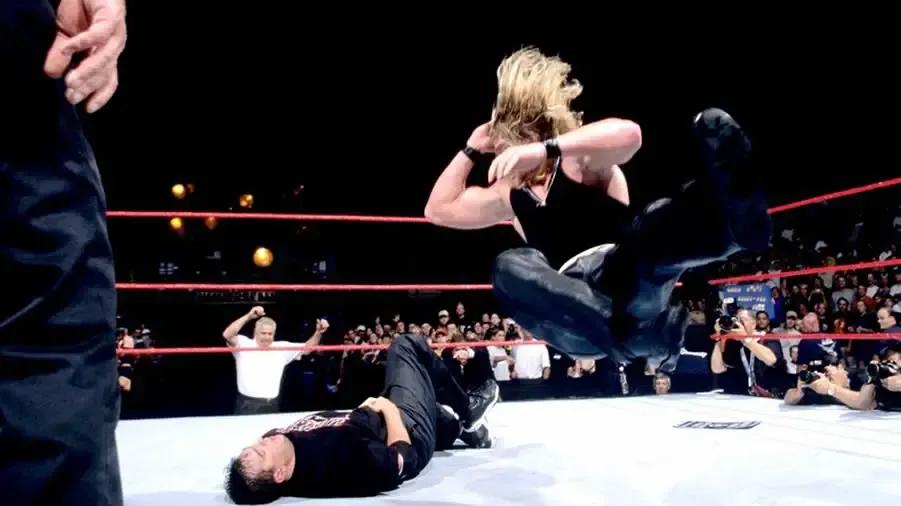
The surprise hit of the 1999 SummerSlam was the "Love Her or Leave Her" Street Fight that pitted Test against Shane McMahon, with Test's courtship with Stephanie hanging in the balance. Few would've guessed that Test and Shane would deliver what many would consider to be the best match of the night, but that's exactly what happened. The timing, intensity, and assortment of exciting spots made the match a true sleeper classic.
According to Pete Gas, the match was extensively rehearsed beforehand, with Shane holding court with Test and the three Mean Street Posse members. Pete noted that over the course of several days Shane went over spots repeatedly, fine-tuning them until he was satisfied with how they were coming off. Can't argue with that sort of meticulous planning - the match elevated the profile of both he and Test, after astonishing the audience with its high quality.
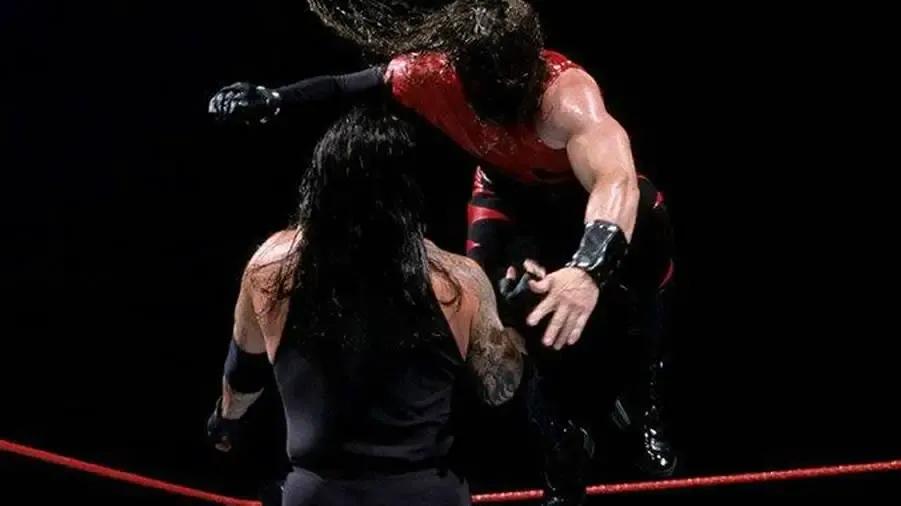
Buried under the slew of frequent title changes in the Attitude Era was Kane and X-Pac dropping the belts they'd won two weeks earlier to The Undertaker and Big Show, who themselves would lose the gold to The Rock and Mankind the week following SummerSlam. You practically need a flow chart to keep track of all of the title changes that occurred in those
simpler
times.
More unusual is the fact that Kane not only held the Tag Team titles twice with partner X-Pac, but he also held Tag Team gold with both opponents. He and Undertaker would reign twice as Tag Team champions in the ensuing couple of years, while he and Big Show would go on to have a somewhat-forgettable five-month run as Raw's Tag Team Champions in 2005-06. Kane would also hold belts with Mankind, The Hurricane, Rob Van Dam, and Daniel Bryan, a byproduct of being on the roster for 23 years.

To put it mildly, Jesse Ventura and Vince McMahon have not always gotten along, which is expected given just how alpha each man tends to be. Ventura dunked hard on Vince in 1994 when he beat his former boss in court over videotape royalties, which only added to the continental divide between them. Yet, the two were able to put any differences aside in later years, notably this SummerSlam.
According to Ventura in a 2012 shoot interview, he did the SummerSlam appearance partially out of spite towards Hulk Hogan and Eric Bischoff. Both were still with the rapidly-decaying WCW, and each was on "The Body's" s**tlist - Bischoff for firing Ventura in 1994, and Hogan for allegedly sabotaging Ventura's attempts to unionize the WWE roster in 1986. Vince may have annoyed Ventura a time or two, but apparently not as much as Hulk or Bischoff had. Ventura was all too happy to help make SummerSlam a major success, while WCW continued its spiral.

This time, it wasn't Hogan. Ventura's 1998 election (as an independent, it should be noted) left a sour feeling on both sides of the political spectrum, as his frank criticisms of both die-hard conservatives and liberals (read: the most extreme ends) didn't sit well with the establishment. One politically-oriented faction attempted to do something about Ventura’s SummerSlam appearance.
The Wrestling Observer Newsletter noted that three days before SummerSlam, the Minnesota chapter of a watchdog group called Common Cause (identified by Dave Meltzer as "liberal", although Common Cause has gone after political figures on both sides) filed a lawsuit to try and prevent Ventura from working SummerSlam, calling it a conflict of interest. The attempted injunction was immediately thrown out by a judge, who claimed it had no legal basis, as nobody stood to be damaged by Ventura taking part in a show-biz performance.
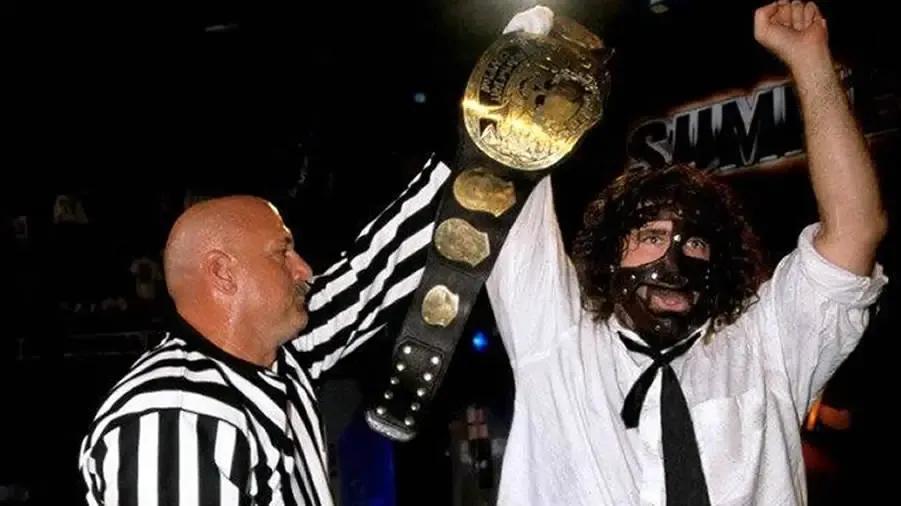
It wasn't as surprising as Lex Luger being all happy and on-board with beating Yokozuna by countout, but it was a shocker nonetheless when Mankind, not Triple H, left SummerSlam 1999 as WWE Champion. Mick Foley was hastily inserted into the World title Triple Threat Match the week before the pay-per-view, pinned Stone Cold, and would only hold the belt for 24 hours before dropping it to Triple H.
The decision to have Mankind play go-between in getting the belt from Austin to Triple H was apparently made just days before SummerSlam. There were rumours that Austin wasn't keen about laying down for Triple H, due to Shawn Michaels allegedly insinuating himself into the situation, as Austin loathed The Kliq's politics from days past. Whatever the case was, Triple H's ascent to the top of WWE didn't take place at SummerSlam as most were expecting, and was instead delayed by 24 hours.
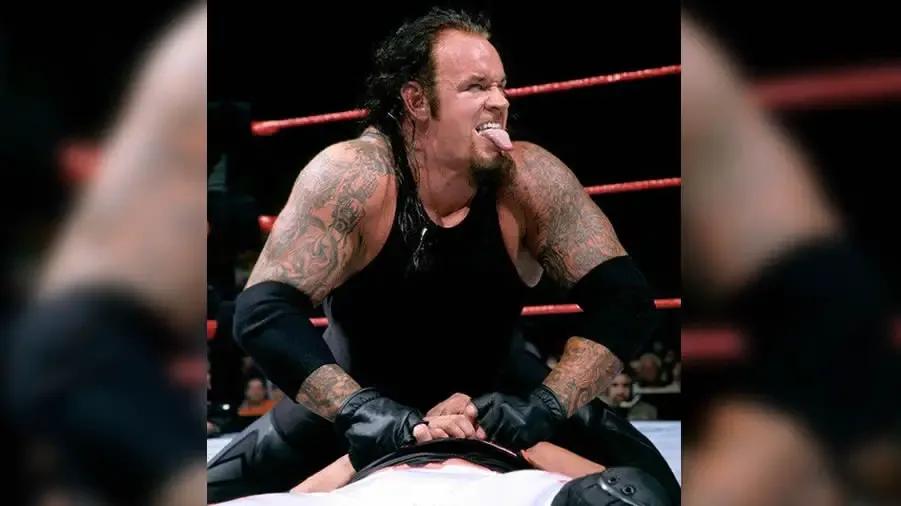
Back before title changes increased in frequency, it was a little rarer to see the WWE Triple Crown (WWE World, Intercontinental, and World Tag Team belts) change hands in close proximity to each other. If two titles changed hands on the same pay-per-view, it was a rather special night. When those title changes did happen more often in the Attitude Era, it should come as little surprise that one show would see all three belts change hands. SummerSlam 1999 was that show.
Mankind's World title win, following Jarrett's IC and Undertaker and Big Show's Tag Team title victories, made SummerSlam 1999 the first of only two cards in which all three of those championships would change hands. The other was TLC 2009, when Sheamus, Drew McIntyre, and DX won the World, Intercontinental, and Tag Team belts respectively over the course of the night.